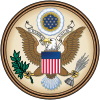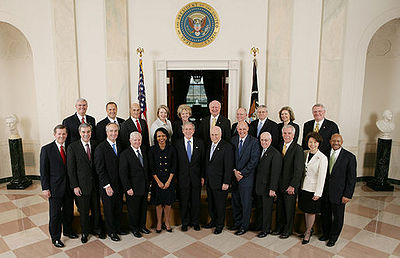- Bush Administration
-
Administration Bush
États-Unis

Cet article fait partie de la série sur la
politique des États-Unis,
sous-série sur la politique.Gouvernement fédéral Portail politique - Portail national L’« administration Bush » (en anglais Bush Administration dont la traduction correcte est plutôt « gouvernement Bush[1] ») assure la gestion de l’État fédéral des États-Unis sous la direction de George W. Bush, 43e président des États-Unis, élu le 20 janvier 2001.
Ce gouvernement ne doit pas être confondu avec le gouvernement de George Herbert Walker Bush (« Bush père »), 41e président des États-Unis entre 1988 et 1992.
Outre le président Bush, ce gouvernement inclut le vice-président Dick Cheney, les différents Secrétaires (équivalents de la fonction de ministre), membres du cabinet des États-Unis et quelques autres conseillers et responsables. Avec le vice-président Dick Cheney et le secrétaire à la Défense Donald Rumsfeld, George Bush s'est entourée d'une équipe de néoconservateurs, rompant ainsi clairement avec la politique du président démocrate Bill Clinton, mais aussi avec la politique plus modérée[réf. souhaitée] de son père.
Le gouvernement Bush comprend ou comprenait des figures déjà présentes dans des gouvernements précédents, en particulier l'ancien secrétaire d'État Colin Powell, qui a été, entre autres fonctions, conseiller à la Sécurité nationale de Ronald Reagan, et le secrétaire à la Défense Donald Rumsfeld, qui était directeur du cabinet à la Maison Blanche et secrétaire à la Défense sous Gerald Ford. Enfin, le vice-président Dick Cheney était secrétaire à la Défense sous Bush père.
La présidence de Bush est caractérisée par l'accent mis sur la prérogative de l'exécutif au détriment des autres pouvoirs, ce qu'on retrouve par exemple dans l'executive order (décret présidentiel) 13 233. Beaucoup d'analystes ont souligné cet aspect lors des trois nominations de juges à la Cour suprême proposées, ainsi que celle du John R. Bolton en tant qu'ambassadeur aux Nations unies.
En novembre 2006, suite aux élections de mi-mandat (élection au Congrès) remportées par les démocrates, Donald Rumsfeld démissionne. Bush nomme alors Robert Gates à ce poste.
L'administration Bush a été remplacée par l'administration Obama en janvier 2009.
Sommaire
Composition du cabinet ministériel
Autres membres du cabinet de la Maison-Blanche
Poste Titulaires Chef de cabinet de la Maison Blanche Andrew Card (2001-2006)
Joshua B. Bolten (2006-2009)Administrateur de l'Agence de protection de l'environnement des États-Unis Christine Todd Whitman (2001–2003)
Michael O. Leavitt (2003–2005)
Stephen L. Johnson (2005-2009)Directeur du Bureau de la gestion et du budget Mitch Daniels (2001-2003)
Joshua B. Bolten (2003-2006)
Rob Portman (2006-2007)
Jim Nussle (2007-2009)Directeur de la politique nationale de contrôle des drogues John P. Walters (2001-2009) Représentant des États-Unis au commerce Robert Zoellick (2001–2005)
Rob Portman (2005-2006)
Susan Schwab (2006-2009)Autres responsables et conseillers
- Conseiller à la Sécurité nationale : Condoleezza Rice (2001–2005), Stephen Hadley (2005-)
- Vice-directeurs de cabinet à la Maison Blanche : Joe Hagin (2001–), Joshua B. Bolten (2001–2003), Harriet Miers (2003–2004), Karl Rove (2005–2007), Joel Kaplan (2006–)
- Conseiller juridique de la Maison Blanche : Alberto R. Gonzales (2001-2005), Harriet Miers (2005-2007), Fred F. Fielding (2007-)
- Secrétaire-attaché de presse-porte-parole de la Maison-Blanche - Ari Fleischer (2001-2003), Scott McClellan (2003-2006), Tony Snow (2006-2007), Dana Perino (2007-)
- Directeur du renseignement national - John Negroponte (2005-2007), Mike McConnell (2007-)
- Directeur de la CIA - George Tenet (2001–2004), John E. McLaughlin (2004), Porter J. Goss (2004-2005), Michael Hayden (2006–)
- Directeur du FBI - Louis Freeh (2001), Thomas Pickard (2001), Robert Mueller (2001–)
- Administrateur de la Nasa : Sean O'Keefe (2001-2005), Michael Griffin (2005-)
- Administrateur de la Federal Aviation Administration : Marion Blakey (2002-2007), Robert A. Sturgell (2007-)
- Ambassadeur à l'ONU - John Negroponte (2001-2004), John Danforth (2004); John R. Bolton (2005-2006); Alejandro Wolff (intérim de décembre 2006 à avril 2007); Zalmay Khalilzad (2007-)
- Secrétaire du Commission des communications fédérales (FCC) - Michael Powell (2001-2005), Kevin Martin (2005-)
- Conseillère - Karen Hughes (2001–2002) Nominée en 2005 au rang d'ambassadeur et sous-secrétaire d'État à la Diplomatie publique et aux Affaires publiques au Département d'État
- Conseillère - Josette Sheeran, ambassadeur et sous-secrétaire d'État américaine aux Affaires économiques, commerciales et agricole (2005-2007), puis directrice du Programme alimentaire mondial (à partir de 2007).
- Conseillère - Cindy Courville (200?-2006), conseillère aux Affaires africaines du Conseil national de sécurité, puis ambassadeur auprès de l'Union africaine depuis novembre 2006.
- Assistant : Lewis Libby (2001–2005)
Législation
Principales législations adoptées
2001
- 7 juin : Economic Growth and Tax Relief Reconciliation Act of 2001
- 18 septembre : loi autorisant l'usage de la force militaire contre les terroristes (à la suite des attentats du 11 septembre 2001)
- 28 septembre : United States-Jordan Free Trade Area Implementation Act
- 26 octobre : USA PATRIOT Act
- 28 novembre : Internet Tax Nondiscrimination Act
2002
- 8 janvier : No Child Left Behind Act
- 9 mars : Job Creation and Worker Assistance Act
- 27 mars : loi de financement des campagnes électorales (loi Russ Feingold/John McCain)
- 13 mai : Farm Security and Rural Investment Act
- 30 juillet : Loi Sarbanes-Oxley
- 16 octobre : loi autorisant l'utilisation de la force armée contre l'Irak
- 25 novembre : loi sur la sécurité intérieure
2003
- 11 mars : Do-Not-Call Implementation Act
- 30 avril : PROTECT Act
- 27 mai : United States Leadership Against HIV/AIDS, Tuberculosis and Malaria Act
- 28 mai : Jobs and Growth Tax Relief Reconciliation Act
- 3 septembre : US-Chile Free Trade Agreement Implementation Act
- 3 septembre : US-Singapore Free Trade Agreement Implementation Act
- 5 novembre : loi d'interdiction de l'avortement partiel (Partial-Birth Abortion Ban Act)
- 3 décembre : Healthy Forests Restoration Act
- 8 décembre : Medicare Prescription Drug, Improvement, and Modernization Act
- 16 décembre : Controlling the Assault of Non-Solicited Pornography and Marketing Act
2004
- 1er avril : Unborn Victims of Violence Act
- 17 juillet : US-Morocco Free Trade Agreement Implementation Act
- 3 aout : U.S.-Australia Free Trade Agreement Implementation Act
2005
- 18 février : Class Action Fairness Act
- 20 avril : Bankruptcy Abuse Prevention and Consumer Protection Act
- 2 août : Dominican Republic-Central America-United States Free Trade Agreement Implementation Act
- 8 août : Energy Policy Act
- 10 août : Safe, Accountable, Flexible, Efficient Transportation Equity Act: À Legacy for Users
- 26 octobre : Protection of Lawful Commerce in Arms Act
- Prorogation pour 20 ans du Price-Anderson Nuclear Industries Indemnity Act.
2006
- 11 janvier : US-Bahrain Free Trade Agreement Implementation Act
- 9 mars : USA PATRIOT Improvement and Reauthorization Act
- 27 juillet : Adam Walsh Child Protection and Safety Act
- 17 août : Pension Protection Act
- 30 septembre : Loi de soutien à la liberté en Iran
- 4 octobre : Department of Homeland Security Appropriations Act
- 17 octobre : Military Commissions Act
- 26 octobre : Secure Fence Act
2008
- octobre : plan Paulson
- novembre : Loi sur l'allongement de la période d'indemnisation des chômeurs
Législation rejetée
Le président George W. Bush a apposé son veto à 4 propositions de loi :
- 19 juillet 2006 : loi sur le financement publique des recherches sur les cellules souches
- 1er mai 2007 : U.S. Troop Readiness, Veterans' Care, Katrina Recovery, and Iraq Accountability Appropriations Act
- 20 juin 2007 : loi sur le financement publique des recherches sur les cellules souches
- 3 octobre 2007 : loi d'extension de la couverture médicale obligatoire aux familles avec enfants
Annexes
Bibliographie
- Struye de Swielande, Tanguy, La Politique étrangère de l'administration Bush, Groupe éditorial Peter Lang, ISBN 978-90-5201-070-0
Notes et références
Articles connexes
Précédé par Administration Bush Suivi par Administration Clinton 
Administration américaine 
2001-2009 Administration Obama - Portail des États-Unis
Catégories : Histoire contemporaine des États-Unis | Cabinet exécutif des États-Unis | Administration Bush
Wikimedia Foundation. 2010.

